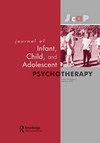在瑞典实施儿童-父母心理治疗(CPP):一项探讨照顾者参与儿童干预经验的质性研究
Q3 Psychology
Journal of Infant, Child, and Adolescent Psychotherapy
Pub Date : 2021-04-03
DOI:10.1080/15289168.2021.1925001
引用次数: 0
摘要
摘要本研究旨在探讨学龄前儿童创伤集中、二元治疗——儿童-家长心理治疗(Child - Parent Psychotherapy, CPP)的体验。CPP已经在美国进行了研究,但从未在瑞典进行过研究,为什么可行性是一个潜在的问题。根据半结构化访谈指南,对来自5个不同治疗机构的11名护理人员进行了访谈。采用解释现象学分析(IPA)进行抽样、数据收集和分析。结果显示了四个积极的主题:通过理解、工具和自信来发展父母;儿童在cpp治疗中的经历和受益——从照顾者的角度;游戏是创伤的反映,是沟通、处理和恢复的途径;以及cpp治疗师的重要性:确认、支持和合作。第五个主题是关于CPP方法的意见和建议——更多的交谈和父母时间。这一主题与涉及立法、责任和暴力方面的障碍的第六个主题部分相关。发现不需要对方法作重大调整。研究结果支持CPP的进一步传播。这种方法似乎填补了学前儿童创伤治疗的空白。本文章由计算机程序翻译,如有差异,请以英文原文为准。
Implementing Child–Parent Psychotherapy (CPP) in Sweden: A Qualitative Study Exploring Experiences by Caregivers Taking Part of the Intervention with Their Child
ABSTRACT The aim of the study was to explore how trauma focused, dyadic, treatment for preschool children, Child – Parent Psychotherapy (CPP), was experienced by the participating caregivers. CPP has been studied in the US, but never in a Swedish context, why feasibility was an underlying question. Eleven caregivers from five different treatment agencies were interviewed according to a semi-structural interview guide. Interpretative phenomenological analysis (IPA) was used in sampling, data collection and analysis. The results showed four positive themes: developing as a parent by working out understanding, tools, and confidence; children’s experiences of and benefits from CPP-therapy – a caregiver perspective; play as a reflection of trauma and a pathway to communication, processing, and recovery; and the importance of the CPP-therapist: validation, support, and cooperation. A fifth theme touched upon opinions and suggestions concerning the CPP method – more talking and parental time. This theme was partly related to a sixth theme covering perceived barriers of legislation, responsibility, and violence. No need for substantial adjustments of the method were found. The findings support further dissemination of CPP. The method seems to fill a gap in trauma treatment offered to pre-school aged children.
求助全文
通过发布文献求助,成功后即可免费获取论文全文。
去求助
来源期刊

Journal of Infant, Child, and Adolescent Psychotherapy
Psychology-Clinical Psychology
CiteScore
1.70
自引率
0.00%
发文量
37
 求助内容:
求助内容: 应助结果提醒方式:
应助结果提醒方式:


